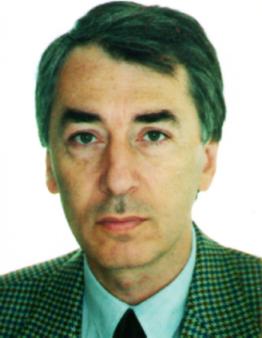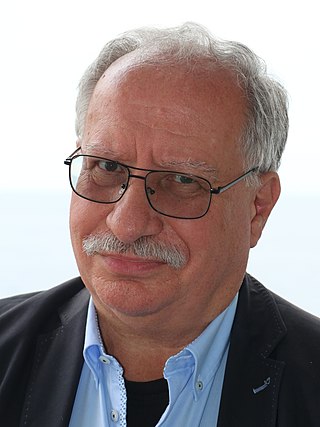In information science, formal concept analysis (FCA) is a principled way of deriving a concept hierarchy or formal ontology from a collection of objects and their properties. Each concept in the hierarchy represents the objects sharing some set of properties; and each sub-concept in the hierarchy represents a subset of the objects in the concepts above it. The term was introduced by Rudolf Wille in 1981, and builds on the mathematical theory of lattices and ordered sets that was developed by Garrett Birkhoff and others in the 1930s.
In compiler optimization, register allocation is the process of assigning local automatic variables and expression results to a limited number of processor registers.
Paulo S. L. M. Barreto is a Brazilian cryptographer and one of the designers of the Whirlpool hash function and the block ciphers Anubis and KHAZAD, together with Vincent Rijmen. He has also co-authored a number of research works on elliptic curve cryptography and pairing-based cryptography, including the eta pairing technique, identity-based cryptographic protocols, and the family of Barreto–Naehrig (BN) pairing-friendly elliptic curves. More recently he has been focusing his research on post-quantum cryptography, being one of the discoverers of quasi-dyadic codes and quasi-cyclic moderate-density parity-check (QC-MDPC) codes to instantiate the McEliece and Niederreiter cryptosystems and related schemes.

Aircrack-ng is a network software suite consisting of a detector, packet sniffer, WEP and WPA/WPA2-PSK cracker and analysis tool for 802.11 wireless LANs. It works with any wireless network interface controller whose driver supports raw monitoring mode and can sniff 802.11a, 802.11b and 802.11g traffic. Packages are released for Linux and Windows.
The European Joint Conferences on Theory and Practice of Software (ETAPS) is a confederation of (currently) four computer science conferences taking place annually at one conference site, usually end of March or April. Three of the four conferences are top ranked in software engineering and one (ESOP) is top ranked in programming languages.
WoLLIC, the Workshop on Logic, Language, Information and Computation is an academic conference in the field of pure and applied logic and theoretical computer science. WoLLIC has been organised annually since 1994, typically in June or July; the conference is scientifically sponsored by the Association for Logic, Language and Information, the Association for Symbolic Logic, the European Association for Theoretical Computer Science and the European Association for Computer Science Logic.
The International Semantic Web Conference (ISWC) is a series of academic conferences and the premier international forum for the Semantic Web, Linked Data and Knowledge Graph Community. Here, scientists, industry specialists, and practitioners meet to discuss the future of practical, scalable, user-friendly, and game changing solutions. Its proceedings are published in the Lecture Notes in Computer Science by Springer-Verlag.

Layered graph drawing or hierarchical graph drawing is a type of graph drawing in which the vertices of a directed graph are drawn in horizontal rows or layers with the edges generally directed downwards. It is also known as Sugiyama-style graph drawing after Kozo Sugiyama, who first developed this drawing style.
Amos Fiat is an Israeli computer scientist, a professor of computer science at Tel Aviv University. He is known for his work in cryptography, online algorithms, and algorithmic game theory.

Peter Ružička was a Slovak computer scientist and mathematician who worked in the fields of distributed computing and computer networks. He was a professor at the Comenius University, Faculty of Mathematics, Physics and Informatics working in several research areas of theoretical computer science throughout his long career.
Massive Online Analysis (MOA) is a free open-source software project specific for data stream mining with concept drift. It is written in Java and developed at the University of Waikato, New Zealand.

Kai T. Salomaa is a Finnish Canadian theoretical computer scientist, known for his numerous contributions to the state complexity of finite automata. His highly cited 1994 joint paper with Yu and Zhuang laid the foundations of the area. He has published over 100 papers in scientific journals on various subjects in formal language theory. Salomaa is a full professor at Queen's University.
Esko Juhani Ukkonen is a Finnish theoretical computer scientist known for his contributions to string algorithms, and particularly for Ukkonen's algorithm for suffix tree construction. He is a professor emeritus of the University of Helsinki.
Maxime Crochemore is a French computer scientist known for his numerous contributions to algorithms on strings. He is currently a professor at King's College London.
Hash-based cryptography is the generic term for constructions of cryptographic primitives based on the security of hash functions. It is of interest as a type of post-quantum cryptography.

Klaus Peter Jantke is a German mathematician, computer scientist, university teacher and academic researcher focusing on Artificial intelligence, Educational technology, Game studies and gamification.
Runtime predictive analysis is a runtime verification technique in computer science for detecting property violations in program executions inferred from an observed execution. An important class of predictive analysis methods has been developed for detecting concurrency errors in concurrent programs, where a runtime monitor is used to predict errors which did not happen in the observed run, but can happen in an alternative execution of the same program. The predictive capability comes from the fact that the analysis is performed on an abstract model extracted online from the observed execution, which admits a class of executions beyond the observed one.

GennadySemenovich Makanin (1938–2017) was a Russian mathematician, awarded the 2010 I. M. Vinogradov Prize for a series of papers on the problem of algorithmically recognizing the solvability of arbitrary equations in free groups and semigroups.
Deepak Kapur is a Distinguished Professor in the Department of Computer Science at the University of New Mexico.
In cryptography, a round or round function is a basic transformation that is repeated (iterated) multiple times inside the algorithm. Splitting a large algorithmic function into rounds simplifies both implementation and cryptanalysis.